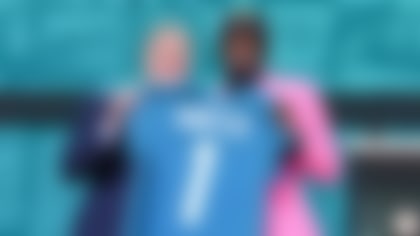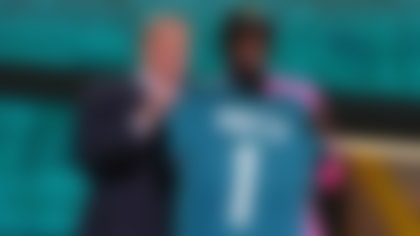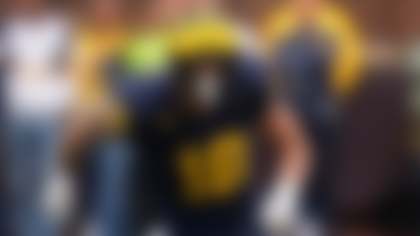The one thing people at several training camps said to me this summer: It's been kind of quiet. They're right. After two straight years, we've finally had a preseason that hasn't been mired in superstar suspension drama. There has been controversy nonetheless, of course. From the new penalties for initiating contact with the helmet to player protests, the early weeks of the upcoming regular season figure to be defined by rules the NFL has made, is still trying to make and figuring out how to enforce.
But as the preseason winds down without a soap opera breaking out, those are just two stories that stand out amid a host of reasons for hope or headaches, depending on where your allegiance lies.
Reasons to hope
You closely track candidates for Comeback Player of the Year. There won't be a shortage because 2017 took an inordinate toll on headliners. The payoff? We now get to enjoy an abundance of returns by luminaries like Andrew Luck, J.J. Watt, Deshaun Watson, Carson Wentz and Aaron Rodgers. All are expected back on the field for 2018, with only Wentz's availability for Week 1 being in some question since Doug Pederson said Sunday Wentz has not yet been cleared for contact.
Luck's return might be the most anticipated. He was hurt for so long -- his shoulder was first injured in September 2015, nearly three years ago -- that it's easy to forget that when he was healthy, he was one of the top quarterbacks in the league and was nearly capable of catapulting the Colts into the playoff picture by himself. Not surprisingly, he has been positively giddy ever since he started throwing early this summer. A sack, in fact, was probably the biggest play of the Colts' preseason because it said as much about Luck's recovery as any pass he threw. Terrell Suggs hammered Luck from the blindside, swatting at his right arm, driving Luck into the ground, where he landed on his right elbow. Luck said later he was happy to take a "legit sack" from Suggs, and realized only after the fact that in landing on that elbow, it was reminiscent of the play that first caused the shoulder injury in 2015.
"I didn't feel anything," Luck said of the sack. "Didn't give it a second thought. That's a big deal for me, being able to lose that thought bubble."
Your team dipped into the quarterback pool at the draft last spring. The top four quarterbacks taken -- Baker Mayfield, Sam Darnold, Josh Allen and Josh Rosen -- have been impressive this summer. A common thread among the four: They immediately showed poise and didn't appear overwhelmed by their new jobs.
Rosen and Mayfield are backups for now because of the quarterbacks in front of them (Sam Bradford has looked good, too, in Arizona) and because of a management decision (Hue Jackson's insistence that Tyrod Taylor is the Browns' starter no matter what), but if they are thrust into games this season, there seems little reason for worry. Darnold and Allen, meanwhile, had the chance to win the opening day starters jobs, and Darnold seems all but certain to be the Jets' starter. Darnold is carrying nearly 50 years of Jets hope on his shoulders. But the headiness with which he has played -- cue up a third-and-13 scramble and slide just past the first-down marker in the Giants-Jets game Friday night -- suggests he has the demeanor to handle the bumps and bruises of a still-rebuilding team and the lofty expectations that will be attached to a highly drafted quarterback who already has Joe Namath's endorsement. It will be a shock if he is not named the starter.
Allen may not be the favorite to start for Buffalo -- and that may be for the best considering the state of the Bills' offensive line -- but he has shown improved footwork and mechanics and much better touch on his passes to accompany the cannon of an arm that drew gasps even from coaches and scouts at the NFL Scouting Combine earlier this year. Whether he starts the season opener or goes in later in the season, Allen's progression from being the least polished of the top four prospects has been the biggest surprise of this quarterback group.
You hung on to that Teddy Bridgewater jersey. There isn't another story in the NFL that has caused the universal delight in coach and player circles that Bridgewater's return from a catastrophic knee injury has. The Jets took a flyer on Bridgewater this offseason (the Jets gave him just $500,000 in guaranteed money), and he has arguably been their best quarterback in the preseason (through three games, he is 28-of-38 for 316 yards, two touchdowns and one interception). Darnold is the Jets' future, but Bridgewater has made the case that he should be in another team's plans right now. General manager Mike Maccagnan has signaled he would be open to trading Bridgewater and as quarterbacks go down with injury or incompetence elsewhere once the season begins, the market for Bridgewater could grow. Good for the Jets, who are enjoying a rare moment of quarterback prosperity. And great for one of the league's best comeback stories.
You are a kick returner. No special teams coach is going to reveal his schemes during the preseason, but the new rules for kickoffs suggest big things are ahead. The key components: The kicking team cannot use a running start, it has to have five players on each side of the ball for the kickoff with no shifting before the kick and no wedges are allowed by the returning team. The expectation among coaches is that the bigger linemen who used to be used on kickoffs will give way to smaller, faster players, and that should make the play safer because the collisions will not be as thundering -- the entire point of the rule. But it could have a bonus. More, and possibly longer, returns.
"I think there will be more returns because you slow guys down up front," said Broncos special teams coordinator Tom McMahon, who said initially he and his players were struggling with how best to go from a complete standstill to sprinting down the field to cover the kickoff. "Everybody is going to have the same perception. You're going to get downfield slower."
You've been waiting for a Cleveland Browns rebound. Todd Haley knows how to call plays. Jarvis Landry knows how to catch a football. Tyrod Taylor knows how to throw one and not get it intercepted. And Gregg Williams will blitz your grandmother. If "Hard Knocks" is any indication, this might be the most combustible coaching staff in football. Maybe it all eventually blows up. In the meantime, the talent is vastly improved, the coordinators are turned up several notches and for the first time in years, the Browns may be as compelling as all those puppy pictures they post on Twitter.
Reasons to worry
You are a member of the NFL Competition Committee or a game official responsible for explaining the helmet rule. From the very beginning, the NFL said it expected it to take time for everybody -- coaches, players, game officials -- to adjust to the dramatic new rule that prohibits lowering the head and initiating contact with the helmet. During the summer, Rich McKay, the chairman of the competition committee, said he expected it to take up to three years for officials to be calling the rule exactly as the league wants it officiated, comparing it to the time it took when protections for defenseless players were added during the 1990s. Alas, it seems that message did not reach some coaches, players and fans because as the flags have fallen, the accompanying hysteria has intensified.
The rule is certainly not going away. The increase in the number of concussions last season combined with the devastating injury suffered by Ryan Shazier demanded changes. Expect fewer flags once the regular season begins -- officials throw more in the preseason in the hope that it will serve as a deterrent -- but also expect players to adjust, as they have with every other significant rule change that has preceded this one. After the second preseason games, the competition committee released a statement clarifying that officials should not throw a flag for incidental contact with the helmet and that may have pumped the breaks on the penalties. In the first two weeks of the preseason, officials threw 1.55 flags per game for helmet rule violations. Through Week 3 of the preseason, the pace had dropped dramatically to 1.22 per game, after officials threw just nine flags in the 16 Week 3 games, a pace just barely over half a flag per game. In all, 60 helmet rule penalties have been called through 49 games, 51 against defensive players, nine against players on offense.
For all the backlash, several coaches have supported the rule's implementation, including the Colts' Frank Reich, who had two helmet calls go against his team in the first half of their second preseason game against the Ravens and who had the first player ejected for such a hit -- safety Shamarko Thomas, who was thrown out of the Colts' first preseason game (he was later released by the team).
"We know that they're going to over-officiate it in preseason. I think we welcome that," Reich said after the Ravens game. "Because I think we all know that the helmet as a weapon is not good for the game. Nobody wants it: coaches, players, fans.
"So if it takes over-officiating it a little bit in the preseason to help us get it right, I think we have to live with that and just understand that's going to happen."
You're the person charged with managing the Chargers' injuries. Each new season, we hope the Chargers' fortunes change but each season they remain wildly snake-bitten. The Chargers have already lost three players to significant injuries -- tight end Hunter Henry, cornerback Jason Verrett and safety Jaylen Watkins -- continuing a trend that has regularly undermined one of the league's best rosters.
You are an offensive line coach, particularly for the Dallas Cowboys. Offensive lines are unnerving almost everywhere and you only had to watch a few preseason games to see Darnold, Luck, Allen or the entire Green Bay Packers' offense to understand the problem. All played with lines that were missing key pieces or were poorly constructed. Predictably, the offenses sputtered. In Green Bay, it's hard to imagine how they got a good read on the backup quarterbacks they were evaluating. More worrisome: After losing three key pieces in the offseason, it may not matter which quarterback starts in Buffalo. Whoever's under center is likely to get pummeled.
But last week, the alarm bells went off for the Cowboys' offensive line, among the best in the NFL when it is intact and a critical factor in the 2016 dominance of Ezekiel Elliott and Dak Prescott. Pro Bowl center Travis Frederick was diagnosed with an autoimmune disease, Guillain Barre Syndrome, and doctors do not know when he will be able to return. Pro Bowl right guard Zack Martin has an injured knee and is hopeful -- but not certain -- to play in Week 1. Former All-Pro left tackle Tyron Smith has chronic knee and back issues that have caused him to miss three games in each of the last two seasons. And guard Connor Williams is a rookie. Yikes. For a team moving on without Jason Witten and Dez Bryant, and expected to rely on Elliott more than ever, these are bad developments.
You were hoping you'd have a chance to succeed Adam Vinatieri as the Colts' kicker. Get comfortable while you wait. Adam Vinatieri, at age 45, blasted a 57-yard field goal during the preseason. It matched his career long, which he kicked 16 years ago.
Follow Judy Battista on Twitter @judybattista.












